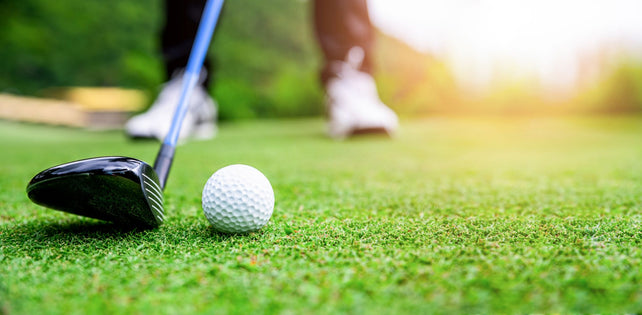Top Ten Tips to Get Better at Golf Without Lessons
Jun 01, 2021
Golf lessons may seem like the only way to get better at golf. What could be more ideal than learning from someone who has years of experience and wisdom on the course? While golf lessons can be helpful, they aren’t required. In fact, a small percentage of golfers seek instruction from a professional.
Not only are golf lessons expensive, but they aren’t always readily available. If you’re an amateur golfer who wants to get better without golf lessons, you’re in luck! Here are the top 10 tips to get better at golf without taking a single lesson.
1. Focus on Your Short Game
Many amateur golfers spend most of their time practicing full shots on the range. While it’s important to improve your long game, neglecting your short game does more harm than good. Focusing on your short game gets you into the mindset of striving to shoot lower scores automatically.

Make an effort to recreate the stress and pressure of having to perfect your short game to build a score. Having a quick short game routine with drills and practicing them often will pay off in the long run.
2. Use a Tee
Why not take advantage of something that makes your life and the game a little easier? There is nothing wrong about teeing up the ball; just ask famous golfer Jack Nicklaus, who tees up on a par 3.

Using a tee offers the advantage of a potentially better hit. Hitting the ball from the ground could sway the ball in a direction that you didn’t want it to go. Using a tee eliminates the risk of hitting the ball thin or fat.
3. Be Prepared Physically
Golf isn’t a fast-paced, high energy game, but it does require some physical exertion. In order to get better at golf, you have to be prepared. Physical conditioning as a golfer is key. You can better prepare yourself for the rounds to come by:
- Walking more often
- Stretching your hamstrings
- Keeping your body limber
Readying your body for golf minimizes the risk of injury and also conditions your body to be ready for hours of walking and swinging.
4. Work on Your Alignment
When you hit a golf ball, your head and body must face the target in the direction in which you’re aiming for the ball to go. Facing a different direction or not looking where you’re trying to make the ball travel is counterintuitive.
As a novice golfer, alignment is crucial. You can use a golf alignment stick or one of your clubs in order to keep your alignment where it needs to be. Use the stick or club as a guide to make sure that your eyes, arms, and feet are parallel to the left of your target.
5. Practice with a Purpose
Wasted time is just that. While it may be fun to head to the range and swing without a care in the world, practicing without a plan can be detrimental to your game. It can also cause you to form bad habits, as well as improper muscle memory.
So, the next time you hit the range, have a plan of attack in mind. This means:
- Picking a target
- Randomizing your club selection
- Setting goals
At the end of the day, practice is only beneficial if it is purposeful.
6. Practice with a Bad Ball
If you want to develop the mental toughness that’s needed to play good golf consistently, try out a trick known as the Worst Ball drill. What better way to get better than by playing with less-than-ideal equipment?

Start on the tee and hit two balls from every position, using the worst balls that you have. The purpose of this drill is to maintain your pre-shot routine while enabling you to focus on every single shot.
Conditioning yourself to handle adversity while also improving your ability to take on trouble shots is key to becoming better.
7. Focus on the Small Stuff
In the world of golf, marginal gains are real. Spending a little bit of time focusing on the small details can add up to make a huge difference in your success on the course.
Before heading to the course, make sure that all of your equipment is clean and ready to go. This includes your clubs, grips, and shoes. It’s also important to bring an extra pair of gloves that fit you well and feel natural.
While these elements may seem unimportant, paying attention to the small things can—and does!—really add up to make a difference.
8. Conserve Energy
Golf may not be the most intense sport, but that doesn’t mean it doesn’t require some athletic ability. Most golfers walk a little over six miles during a round. The average golfer will burn around 1,500 calories over the course of a round.
Golf is tiring and, after a few hours, fatigue will set in, which can have a huge impact on your game. Golfers should not only conserve energy but take nutrition and hydration very seriously.
9. Don’t Neglect Your Mental Game
Getting better at golf goes beyond knowing how to properly putt the ball. Golf is a mental game that can really wreak havoc on your mind. Because every shot counts, more often than not you’re stuck facing the reality of a failed play on almost every hole.
Golf is also unique in that you spend hours on the course, but only play a few minutes hitting the ball. This makes it much easier to get frustrated and lose focus.
To get better at golf, you must reset your mental approach to the game. Accept bad shots and make a conscious effort to approach the game relaxed and focused.
10. Practice More
When practicing at a local course, you’re at the mercy of many uncontrollable factors. From the weather to a jam-packed course, there are all sorts of things that can keep you from practicing as often as you’d like.
What if you could practice and get better at golf from the comfort and convenience of your own home? Bring the golf course into your garage or basement with a residential golf simulator. This innovative product allows you to practice at any time, no matter the hour or the weather.

Foresight Sports offers some of the best residential golf simulators on the market. With one of our at-home simulators, you can practice and get better at the game when it’s most convenient for you. Browse our full collection of residential simulators.




































